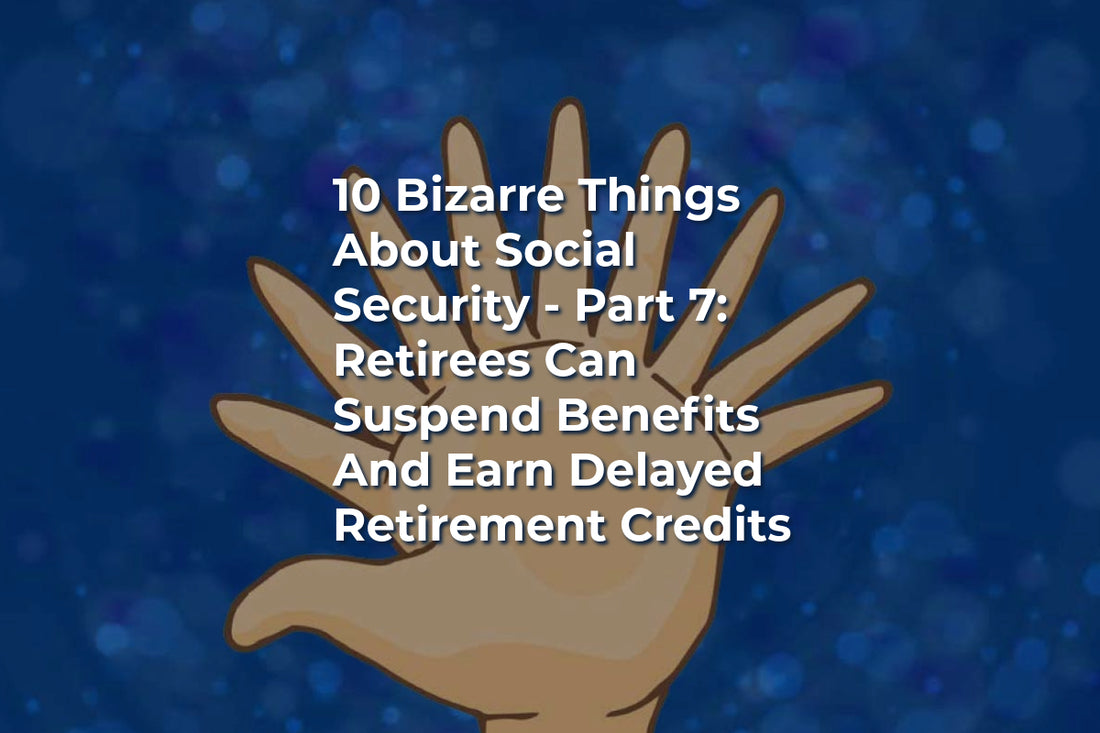Since 2016, retirees can no longer use the Social Security strategy known as “File and Suspend.” Retirees and financial planners have historically used this strategy to help maximize their Social Security benefits. Now, retirees are able to get Delayed Retirement Credits. Let me tell you how this works.
Basically, anybody can still suspend their benefits at their Full Retirement Age (age 66 for most current retirees).
How to Suspending Your Benefits Works
This works for individuals who have already claimed their Social Security benefits, but are younger than age 70.
Additionally, they must wait until their Full Retirement Age before suspending their benefits.
Why would someone who already claimed their benefits suspend them at their full retirement age?
If they claimed their Social Security early at age 62, they are receiving the smallest benefit income possible for them. Not only that, but they will receive that amount for the rest of their life. But if a few years later they regret claiming when they did, they have the option to suspend it. Suspending your claim could result in a much bigger Social Security amount.
At your Full Retirement Age, you can suspend your benefits and earn Delayed Retirement Credits. This means you will stop receiving your monthly benefit checks, but the size of your benefit will grow by 8% per year up until age 70.
You can unsuspend your benefits at any time between age 66 – 70. But if you wait until 70 to resume your benefit checks, it could easily be 40% - 50% higher.
This is because of Delayed Retirement Credits. Hardly anybody knows they can do this, but now you do!
Delayed Retirement Credits
Here’s an example.
Lindy Changes Her Mind
Table 5
Table 5 shows that Lindy has a Full Retirement Age Benefit of $1,500 per month. But because she claimed her benefit at age 62, it is reduced to only $1,125. With an assumed annual COLA (Cost of Living Adjustment) increase of 3%, Lindy’s monthly Social Security check gets a little bigger every year and grows to $1,229 when she is age 65.
Later, she regrets her decision and wishes her benefit was bigger. She decides to suspend her benefits at her Full Retirement Age of 66. Once she suspends her benefits at age 66, she will stop receiving monthly Social Security checks. This is illustrated in the table above, where you see $0s for her monthly Social Security income at ages 66–69.
During those four years between ages 66 and 69, Lindy’s suspended benefit will earn Delayed Retirement Credits. This will cause the benefit to grow by 8% per year.
At age 70, she can unsuspend her benefit and receive a monthly Social Security check of $1,881, which includes four years of Delayed Retirement Credits and four years of Retroactive COLA Credits. Lindy will receive this larger benefit for the rest of her life.
The benefit Lindy receives at age 70 is now 53% bigger than her benefit at age 65, be-fore she suspended it. It results in an additional $652 per month and $7,824 per year. With an assumed annual COLA increase of 3%, that benefit amount will continue to grow bigger and bigger for the rest of her life.
How does this apply to the Spousal Benefit?
If Lindy suspended her benefits after April 30, 2016 and had a spouse who was receiving a Spousal Benefit, her spouse would stop receiving that monthly Spousal Benefit check until Lindy unsuspended her benefits at age 70. Lindy’s suspended benefit receives Delayed Retirement Credits and grows by 8% per year up to age 70, but the Spousal Benefit does not.
Both married spouses and single individuals can do this. Even if you claimed your benefits at your Full Retirement Age or later, if you are younger than age 70, you can still suspend your benefits and earn Delayed Retirement Credits.








